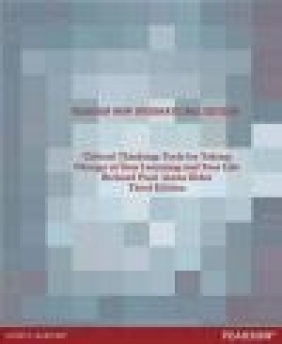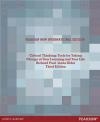Critical Thinking
Linda Elder, Richard Paul
Critical Thinking
Linda Elder, Richard Paul
- Producent: Pearson
- Rok produkcji: 2013
- ISBN: 9781292027142
- Ilość stron: 488
- Oprawa: Miękka
Niedostępna
Opis: Critical Thinking - Linda Elder, Richard Paul
For Student Success and Career Development, or Critical Thinking courses. Written by two of the leading experts in the field, this book's approach to critical thinking is as a process for taking charge of and responsibility for one's thinking. Based in theory developed over the last 30 years, it focuses on an integrated, comprehensive concept of critical thinking that is both substantive and practical; it fosters the development of basic intellectual skills students need to think through content in any class, subject, or discipline, as well as through any problem or issue they face. Simply stated, this text offers students the intellectual tools they need for lifelong learning, and rational, conscientious living. In this edition, several advanced chapters were eliminated, many diagrams have been added or enhanced, and the glossary of critical thinking terms has been more strongly developed. TECHNOLOGY OFFERING: MyStudentSuccessLab is available with this book upon request. It is an online solution designed to help students 'Start strong, Finish stronger' by building skills for ongoing personal and professional development. Go to http://mystudentsuccesslab.com/mssl3 for a Point and Click DEMO of the Time Management module.Preface INTRODUCTION A Start-Up Definition of Critical Thinking How Skilled Are You as a Thinker? Good Thinking Requires Hard Work The Concept of Critical Thinking Become a Critic of Your Thinking Establish New Habits of Thought Develop Confidence in Your Ability to Reason and Figure Things Out Chapter 1 - BECOME A FAIRMINDED THINKER Weak versus Strong Critical Thinking What Does Fairmindedness Require? Intellectual Humility: Strive to Discover the Extent of Your Ignorance Intellectual Courage: Develop the Courage to Challenge Popular Beliefs Intellectual Empathy: Learn to Enter Opposing Views Empathically Intellectual Integrity: Hold Yourself to the Same Standards to Which You Hold Others Intellectual Perseverance:Refuse to Give Up Easily; Work Your Way through Complexities and Frustration Confidence in Reason: Respect Evidence and Reasoning, and Value Them as Tools for Discovering the Truth Intellectual Autonomy: Value Independence of Thought Recognize the Interdependence of Intellectual Virtues Conclusion Chapter 2 - THE FIRST FOUR STAGES OF DEVELOPMENT: AT WHAT LEVEL OF THINKING WOULD YOU PLACE YOURSELF? Stage 1: The Unreflective Thinker Stage 2: The Challenged Thinker Stage 3: The Beginning Thinker Stage 4: The Practicing Thinker A "Game Plan" for Improvement A Game Plan for Devising a Game Plan Integrating Strategies One by One Chapter 3 - SELF-UNDERSTANDING Monitor the Egocentrism in Your Thought and Life Make a Commitment to Fairmindedness Recognize the Mind's Three Distinctive Functions Understand That You Have a Special Relationship to Your Mind Connect Academic Subjects to Your Life and Problems Learn Both Intellectually and Emotionally Chapter 4 - THE PARTS OF THINKING Reasoning Is Everywhere in Human Life Reasoning Has Parts A First Look at the Elements of Thought An Everyday Example: Jack and Jill Analysis of the Example How the Parts of Thinking Fit Together The Relationship between the Elements Critical Thinkers Think to Some Purpose Critical Thinkers Take Command of Concepts Critical Thinkers Assess Information Inert Information Activated Ignorance Activated Knowledge Critical Thinkers Distinguish between Inferences and Assumptions Critical Thinkers Think through Implications Critical Thinkers Think across Points of View The Point of View of the Critical Thinker Conclusion Chapter 5 - STANDARDS FOR THINKING Take a Deeper Look at Universal Intellectual Standards Clarity Accuracy Precision Relevance Depth Breadth Logic Significance Fairness Bring Together the Elements of Reasoning and the Intellectual Standards Purpose, Goal, or End in View Question at Issue or Problem to Be Solved Point of View or Frame of Reference Information, Data, Experiences Concepts, Theories, Ideas Assumptions Implications and Consequences Inferences Brief Guidelines for Using Intellectual Standards Chapter 6 - ASK QUESTIONS THAT LEAD TO GOOD THINKING The Importance of Questions in Thinking Questioning Your Questions Dead Questions Reflect Inert Minds Three Categories of Questions Become a Socratic Questioner Focus Your Thinking on the Type of Question Being Asked Focus Your Questions on Universal Intellectual Standards for Thought Focus Your Questions on the Elements of Thought Focus Your Questions on Prior Questions Focus Your Questions on Domains of Thinking Conclusion Chapter 7 - MASTER THE THINKING, MASTER THE CONTENT Go Beyond Superficial Memorization to Deep Learning The Relation of Content to Thinking Understand Content through Thinking and Thinking through Content All Content Is Organized by Concepts All Content Is Logically Interdependent Think through Your Classes Using Your Knowledge of Thinking A Caution Chapter 8 - DISCOVER HOW THE BEST THINKERS LEARN 18 Ideas for Improving Your Studies The Logic of a Typical College Class Becoming a Skilled Thinker The Design of a Typical College Class and the Typical College Student Figure Out the Underlying Concept of Your Courses Figure Out the Form of Thinking Essential to Courses or Subjects Think within the Logic of the Subject The Logic of Biochemistry The Logic of Four Additional Disciplines The Logic of Biology The Logic of Ecology The Logic of Aerospace Engineering The Logic of Electrical Engineering Make the Design of the Course Work for You Sample Course: American History, 1600-1800 Reading, Writing, Speaking, Listening, and Thinking Figure Out the Logic of an Article or Essay Figure Out the Logic of a Textbook Criteria for Evaluating an Author's Reasoning Chapter 9 - REDEFINE GRADES AS LEVELS OF THINKING AND LEARNING Develop Strategies for Self-Assessment Use Profiles to Assess Your Performance Exemplary Students (Grade of A) High-Performing Students(Grade of B) Mixed-Quality Students (Grade of C) Low-Performing Students (Grade of D or F) Apply Student Profiles to Assess Your Performance within Specific Disciplines Exemplary Thinking as a Student of Psychology (Grade of A) High-Performing Thinking as a Student of Psychology (Grade of B) Mixed-Quality Thinking as a Student of Psychology (Grade of C) Low-Performing Thinking as a Student of Psychology (Grade of D or F) Conclusion Chapter 10 - MAKE DECISIONS AND SOLVE PROBLEMS Making Decisions Evaluating Patterns in Decision-Making "Big" Decisions The Logic of Decision-Making Dimensions of Decision-Making The Early Decisions (2-11 Years of Age) Adolescent Decisions (12-17 Years of Age) Solving Problems Becoming an Activist Problem-Solver Evaluating Patterns in Your Problem-Solving "Big" Problems Dimensions of Problem-Solving Avoiding the Pitfalls of Problem-Solving Analyzing Problems Using the Elements of Thought The Art of Problem-Solving Conclusion Chapter 11 - DEAL WITH YOUR IRRATIONAL MIND Take Charge of Your Egocentric Nature Understand Egocentric Thinking Understand Egocentrism as a Mind within the Mind Successful Egocentric Thinking Unsuccessful Egocentric Thinking Rational Thinking Two Egocentric Functions Pathological Tendencies of the Human Mind Challenge the Pathological Tendencies of Your Mind The Challenge of Rationality Take Charge of Your Sociocentric Tendencies The Nature of Sociocentrism Social Stratification Sociocentric Thinking Is Unconscious and Potentially Dangerous Sociocentric Uses of Language Disclose Sociocentric Thinking through Conceptual Analysis Reveal Ideology at Work through Conceptual Analysis Conclusion Chapter 12 - HOW TO DETECT MEDIA BIAS AND PROPAGANDA IN NATIONAL AND WORLD NEWS Democracy and the News Media Myths That Obscure the Logic of the News Media "Objectivity" in the News Media Points of View Forms of Objectivity The Perception of Bias in the Mainstream Propaganda and News Story Writing Protecting the Home Audience from Guilt Feelings Fostering Sociocentric Thinking Slanting Stories to Favor Privileged Views How to Obtain Useful Information from Propaganda and Standard News Stories Steps in Becoming a Critical Consumer of the "News" Media Awareness of Media Bias The Bias toward Novelty and Sensationalism Critical Consumers of the News Questions for the News Media Finding Alternative Sources of Information Becoming an Independent Thinker Buried, Ignored, or Underreported Stories Using the Internet Additional Alternative News Sources Conclusion Chapter 13 - FALLACIES: THE ART OF MENTAL TRICKERY AND MANIPULATION Truth and Deception in the Human Mind Three Types of Thinkers Uncritical Persons (Intellectually Unskilled Thinkers) Skilled Manipulators (Weak-Sense Critical Thinkers) Fairminded Critical Persons (Strong-Sense Critical Thinkers) The Concept of Fallacies of Thought Naming Fallacies Mistakes versus Fallacies No Exhaustive List of Fallacies Faulty Generalizations Analyzing Generalizations Post Hoc Generalizations Analogies and Metaphors 44 Foul Ways to Win an Argument Fallacy Detection: Analyzing a Speech from the Past Fallacy Detection: Analyzing a Current Presidential Speech Fallacy Detection: Analyzing a Speech from a Presidential Candidate Avoid Two Extremes Conclusion Chapter 14 - DEVELOP AS AN ETHICAL REASONER Why People Are Confused about Ethics The Fundamentals of Ethical Reasoning Ethical Concepts and Principles The Universal Nature of Ethical Principles Distinguishing Ethics from Other Domains of Thinking Understanding Our Native Selfishness Conclusion Chapter 15 - STRATEGIC THINKING: PART ONE Understanding and Using Strategic Thinking Components of Strategic Thinking The Beginnings of Strategic Thinking Key Idea #1: Thoughts, Feelings, and Desires Are Interdependent Key Idea #2: There Is a Logic to This, and You Can Figure It Out Key Idea #3: For Thinking to Be of High Quality, We Must Routinely Assess It Chapter 16 - STRATEGIC THINKING: PART TWO Key Idea #4: Our Native Egocentrism Is a Default Mechanism Key Idea #5: We Must Become Sensitive to the Egocentrism of Those around Us Key Idea #6: The Mind Tends to Generalize Beyond the Original Experience Key Idea #7: Egocentric Thinking Appears to the Mind as Rational Key Idea #8: The Egocentric Mind Is Automatic in Nature Key Idea #9: We Often Pursue Power through Dominating or Submissive Behavior Key Idea #10: HumansAre Naturally Sociocentric Animals Key Idea #11: Developing Rationality Requires Work Conclusion Chapter 17 - BECOMING AN ADVANCED THINKER: OUR CONCLUSION Practicing Skilled Thinking Stage 5: Reaching the Advanced Stage of Development Stage 6: Becoming an Accomplished Thinker Qualities of Mind of an Accomplished Thinker The Inner Logic of the Accomplished Thinker The Ideal Thinker Appendices A A Brief History of The Idea of Critical Thinking B Sample Analysis of The Logic of ... Glossary References Index
Producent:
GPSR Pearson Central Europe Sp. z o.o.
ul. Szamocka 8
01-748 Warszawa (PL)
tel: 459 596 060
email: [email protected]
Szczegóły: Critical Thinking - Linda Elder, Richard Paul
Tytuł: Critical Thinking
Autor: Linda Elder, Richard Paul
Producent: Pearson
ISBN: 9781292027142
Rok produkcji: 2013
Ilość stron: 488
Oprawa: Miękka
Waga: 1.06 kg






















